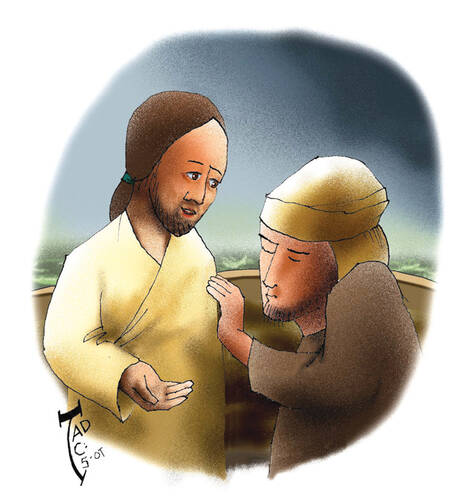God Meets Us
The prophet Isaiah’s call narrative is also a theophany, in which Isaiah perceives God on the heavenly throne. God’s majesty and transcendence overwhelm the prophet, and Isaiah’s descriptions of God by means of physical images— a vision of a high throne and the hem of a garment that fills the Temple—evoke God’s universal kingship and splendor.
In this divine vision, the seraphim minister to God, praising God’s holiness and the glory that fills the earth. The seraphim also prepare the prophet for his mission. In response to Isaiah’s claims that he is unworthy, “a man of unclean lips,” a seraph places a burning coal on Isaiah’s lips, purifying him. Isaiah is now prepared to carry God’s message to the people, since his “guilt has departed” and his “sin is blotted out.” The call narrative contrasts the majesty of God, holy, glorious and mighty, and the human ordinariness of Isaiah, who must be prepared to bear God’s message. Angels purify Isaiah so that he can prophecy for God.
The narrative also draws our attention to another reality. Most of us do not experience throne visions and theophanies that overwhelm us with God’s might and reflect God’s transcendence when we encounter God. Most of us experience God in the mundane experiences of daily life, in the ordinary reality of doing our work, talking with friends, in the ups and downs of family life, walking the dog, seeing a movie, riding the subway or kayaking on a lake.
The ordinary work and leisure of everyday life are where God tends to reach out to meet us. God comes to us where we are, as we are. Jesus met his first disciples and apostles at their work. When Simon, Andrew (unnamed in this account), James and John first meet Jesus in Luke’s Gospel, they were not overwhelmed by a vision but were fixed on their work. They were not expecting seraphim, let alone a theophany; they were washing their nets after a fruitless night of fishing.
Jesus, however, began to preach from Simon Peter’s boat, a powerful image for God’s presence in the ordinariness of human life. Not in the Temple or a synagogue, where Jesus could also be found, but in the boat of a few working men is where the encounter with the incarnate God took place. After Jesus finished speaking to the crowds, he turned to the work at hand, the work of fishing.
Jesus told Simon to “put out into the deep water and let down your nets for a catch.” Simon was reluctant to start the process again, especially when they had caught nothing all night, but when he did put the nets back into the water the catch of fish was almost immediate, the nets straining with the bounty. There were so many fish that the nets began to break, they called for help to James and John, and their boats began to sink.
It is in response to the overwhelming catch of fish that Simon Peter recognizes the presence of God in his fishing boat in the seemingly ordinary person of Jesus. Like Isaiah in God’s Temple, Simon’s sense of unworthiness in the presence of God overwhelms him: “He fell down at Jesus’ knees, saying, ‘Go away from me, Lord, for I am a sinful man!’” A profound recognition of God incarnate took place not while Jesus was transfigured or enthroned in majesty, but in the casting and drawing up of their fishing nets.
In response to the miraculous catch of fish, Peter recognizes God with him. For Peter and the other fishermen, the encounter was a call to a new life—“Do not be afraid; from now on you will be catching people”—and they left their work to follow Jesus.
God met Peter, and God meets us, where we are. Like Isaiah, Peter initially felt unworthy, unready and unprepared for the encounter and for his new work, but God sees us and wants us for who we are and where we are. God will purify us, prepare us for our tasks and make us ready to do our work, however ordinary or exalted this work might be. But our ordinariness will always be a part of who we are, not a place absent from God but where God meets us every day.
This article also appeared in print, under the headline “God Meets Us,” in the February 1, 2016, issue.








